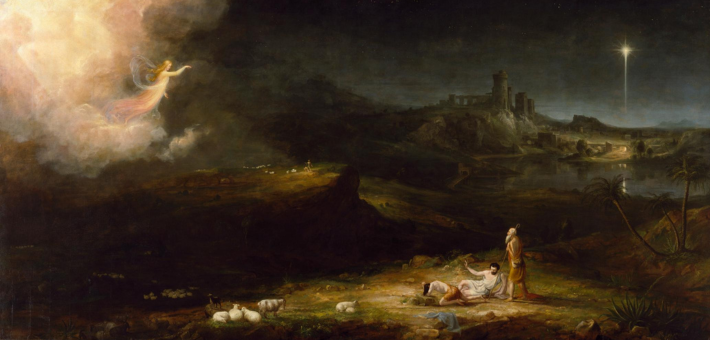Commentary on Psalm 96
Psalm 96 is a psalm of pure exultation, so very appropriate for Christmas Eve.1
We are enjoined, indeed the whole earth is enjoined, to sing a new song to the Lord. The waiting is over … sing a new song. And if this very old song is not sung as a new song on this occasion, we miss the spirit that is at the heart of the psalm.
So, we might well ask, How shall we sing a new song? In many ways Psalm 96 provides for us a model of how to praise. We sense this in the expansive use of imperative verbs throughout the psalm. And we are helped in understanding this model by James Mays, who, in his book on the theology of the Psalms,2 invites us to see the fundamental purpose of praise in the Psalter as threefold:
- doxological,
- confessional, and
- evangelical.
We see these three purposes clearly at work in Psalm 96.
Praise is doxological
Doxology is present whenever the Lord is glorified. Psalm 96 begins with doxology, and praise is present everywhere. Throughout the psalm, the Lord is the singular object of praise. The first three verses direct us to sing to the Lord… bless the name of the Lord… declare the glory of the Lord. Indeed three times in this short psalm (verses 3, 7, and 8), we are told to declare God’s glory (kebod in Hebrew, doxa in Greek). The name of “the LORD” is repeated 11 times. And then, in verse 9, we are told to “worship” the Lord, the central work of doxology.
Praise is confessional
As with all psalms of praise, Psalm 96 confesses who God is and what God has done. We pray the psalms not only as praise but also that we might better know God.
The content of any psalm’s confession is often found in those verses or clauses that begin with the conjunction “for” or “because.” These verses offer up the reasons we are called upon to render praise. We might call these “key” clauses because in Hebrew, this conjunction is ki.
Verses 4 and 5 both begin with “for …”—ki. Verse 4 tells us that we worship the Lord because the Lord is great. But the single world “great” is not sufficient. The reason is expanded: The Lord is greater than other gods. In fact, those gods are not gods at all. Those gods are idols. The Lord made the heavens. There is almost always a narrative aspect to confession. Confession often recalls other parts of the biblical story or, in this case, the prophets or other psalms.
Confession is also present in verse 10 in what we are invited to say among the nations.
“The world is firmly established,” tying the creation of the earth to the creation of the heavens in verse 5. Creation is, here and elsewhere, not only a statement about the cosmic past; it is a promise for the present and the future: “It shall never be moved!” Confession moves in the direction of promise. And part of the promise is, surprisingly, that judgment is not a threat, as we so often hear it, but rather, good news.
This reality of the psalms came as a great surprise to C. S. Lewis in his Reflections on the Psalms.3 The final verse, 13, echoes the promise of judgment. Judgment arises from equity, fairness, righteousness, truth, and justice. This positive judgment is what we experience in the coming of the Lord—in the psalms, at Easter, and incarnationally at Christmas.
Praise is evangelical
Psalmic praise serves as proclamation of and witness to the good news of God. When we name the tradition and the “Good News” (the Gospel or evangel) into our lives and into the lives of those around us, our praise is evangelical.
Look carefully again at the grammar of the verbs in Psalm 96. The numerous imperatives are addressed to the faithful, instructing them to proclaim the reality of God to others. And who are these faithful who are instructed to give praise?
In verse 1 and again in verse 9, they are “all the earth.” We rightly assume this refers to all the people of the earth as in verse 7: “O families of the earth.” The very use of the word “families” rather than “nations” lends a positive assessment to all the peoples of the earth. Notably, the very ones who are called to praise are also, as the “nations” and “peoples,” the recipients of the words (see verses 3, 5, 10).
But most wonderfully in Psalm 96, “all the earth” is not limited to humanity. In verses 11–12 the Lord who made the heavens and the earth instructs the very creation to offer praise. Not only the general heaven and earth, but also the very sea is invited to roar. And this roaring is heard not as threat to God but, rather, as praise.4
And then, for good measure, the field is invited to exult: the ordered praise of cultivation. And just as the heaven and earth are joined by the chaotic sea, so also the cultivated field is joined by the wild trees of the forest. The praise of the Lord knows no boundaries!
All are part of God’s good work, and all are invited to sing praises. This Good News ensures that praise is not limited or confined to either the human or the orderly. A new song indeed!
Notes
- Commentary previously published on this website for December 24, 2017.
- See chapter 4, “Praise Is Fitting: The Psalms as Instruction in Praise,” in James L. Mays, The Lord Reigns: A Theological Handbook to the Psalms (Louisville, KY: Westminster John Knox, 1994), 61–71.
- C. S. Lewis, Reflections on the Psalms (San Diego: Harcourt Brace Jovanovich, 1958), 9–10.
- William P. Brown, Seeing the Psalms: A Theology of Metaphor (Louisville, KY: Westminster John Knox), 128–29.


December 24, 2024